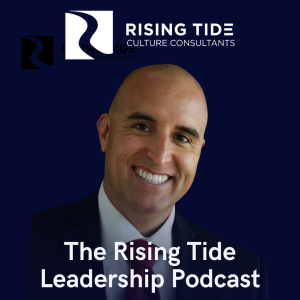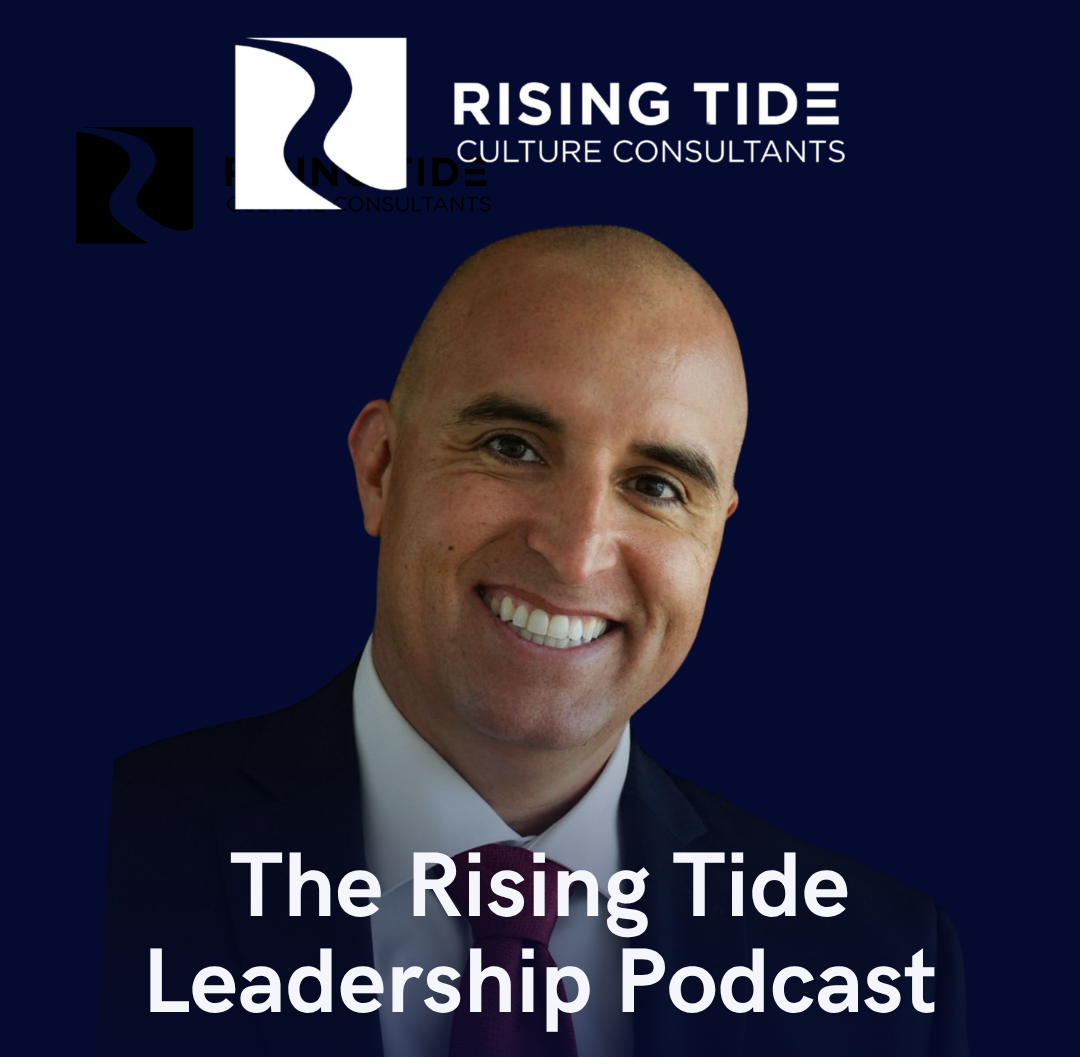Episodes

Tuesday Jan 13, 2026
The Leadership Legacy Test | Rabbi Daniel Cohen (Ep. 148)
Tuesday Jan 13, 2026
Tuesday Jan 13, 2026
What if leadership isn’t about titles, success, or influence—but about how people feel after being with you?
✨ In this powerful conversation, Rabbi Daniel Cohen challenges leaders to rethink legacy, presence, and the daily choices that shape relationships. We unpack purpose, conviction vs. convenience, small acts of kindness, and why great leaders never confuse their role with their soul. This episode will make you pause, reflect, and lead differently.
👉 The question is: what will your leadership leave behind?
#LeadershipDevelopment #IntentionalLeadership #LegacyLeadership #RelationalLeadership #LeadWithPurpose #LeadershipMindset #PersonalGrowth #Influence #Presence #valuesbasedleadership

Thursday Jan 08, 2026
If You Can’t Step Away, You’re Not Leading | Jesse P. Gilmore (Ep. 147)
Thursday Jan 08, 2026
Thursday Jan 08, 2026
What if the biggest threat to your leadership isn’t your team—but you? 🤯 In this episode, MO sits down with Jesse P. Gilmore to unpack why so many leaders become the bottleneck in their own organizations—and how that quietly wrecks trust, momentum, and relationships. From single points of failure to sustainable leadership, this conversation is real, practical, and freeing.
🚀 Leadership question: If you stepped away tomorrow, would your team thrive—or stall?
#Leadership #Entrepreneurship #CEOLeadership #BusinessGrowth #HealthyLeadership #FounderLife #TeamCulture #WorkLifeBalance #LeadBetter #risingtideleadership
Website: https://www.nicheincontrol.com/
LinkedIn: https://www.linkedin.com/in/jessepgilmore
Leverage for Growth Wall of Proof: https://www.nicheincontrol.com/lfg-wall-of-proof

Monday Jan 05, 2026
Adapt or Stagnate: The Leadership Choice This Year (Ep. 146)
Monday Jan 05, 2026
Monday Jan 05, 2026
New year, new goals… but will your leadership actually hold up under pressure? 🎯
In this episode of the Rising Tide Leadership Podcast, Mo and Scott dig into why adaptability starts with self-awareness, how pressure exposes your real leadership style, and why your greatest strengths might quietly become your biggest limitations. From real-life leadership moments to unexpected lessons, this conversation will challenge how you think about growth, relationships, and influence in the year ahead.
👉 So here’s the question: when pressure hits, what do people experience from you as a leader?
#LeadershipDevelopment #LeadershipPodcast #NewYearLeadership #AdaptableLeadership #SelfAwareLeader #LeadershipGrowth #LeadingUnderPressure #InfluenceMatters #PersonalGrowth #RisingTideLeadership

Monday Dec 29, 2025
How to Set Leadership Goals Without Burning Out (Ep. 145)
Monday Dec 29, 2025
Monday Dec 29, 2025
Why do so many leaders start strong with goals—only to quit a few weeks later? 🤔
In this solo episode, MO breaks down why most goals fail and how leaders can build goals that actually last. Drawing from elite athletics 🏊♂️, coaching, and real-world leadership, this episode challenges you to stop taking huge bites and start making meaningful progress—one step at a time. Plus, MO shares the exact goal-setting framework he uses with leaders he coaches (and yes, it’s free 👀).
So… who actually knows your goals right now?
#LeadershipDevelopment #GoalSetting #LeadershipGrowth #IntentionalLeadership #AccountabilityMatters #PersonalGrowth #SelfLeadership #HighPerformanceLeadership #LeadershipPodcast #RisingTideLeadership

Thursday Dec 11, 2025
Why Your Team Isn’t Listening — And How to Fix It | Amos Balongo (Ep. 144)
Thursday Dec 11, 2025
Thursday Dec 11, 2025
In this episode, MO sits down with global communication coach Amos Balongo to unpack why some leaders inspire action while others get ignored. 🚀 From connecting before you communicate, to eliminating blind spots, to building presence that actually lifts people, Amos drops practical tools you can use today. If your leadership isn’t landing the way you want… what’s holding you back? 🤔
#LeadershipPodcast #AmosBalongo #CommunicationSkills #LeadWithInfluence #LeadershipDevelopment #EffectiveCommunication #TeamLeadership #PersonalGrowth #LeadershipTips #riseandlead
Website: https://amosbalongo.com/
Podcast: https://www.transformationalpodcast.com/

Thursday Dec 04, 2025
How AI Reveals Your Leadership Blind Spots | Ben Perreau (Ep. 143)
Thursday Dec 04, 2025
Thursday Dec 04, 2025
AI is changing leadership faster than anyone expected 🤖🔥—but what does that mean for YOU as a leader? In this episode, Mo sits down with Ben Perreau, founder of Parafoil, to explore how AI can improve self-awareness, strengthen teams, and expose blind spots we didn’t know we had. If leadership is about people, how do we stay human in an AI-driven world? Ready to find out? 👀
✨ What part of leadership are YOU most excited to reinvent?
#leadership #AIleadership #futureofwork #selfawareness #BenPerreau #Parafoil #digitalleadership #raiseyourinfluence #personaldevelopment #leadersgrow

Tuesday Dec 02, 2025
How Art Makes You a Better Leader | Matt Sandoval (Ep. 142)
Tuesday Dec 02, 2025
Tuesday Dec 02, 2025
What does real resilience look like in a world full of pain, trauma, and broken systems? 💥 In this episode, MO sits down with Matt Sandoval, CEO of Free Arts AZ, to explore how leaders can create safety, inspire healing, and build hope through creativity, mentorship, and compassion. 🎨✨ If leaders are supposed to “fix” everything… what does it actually mean to lead people who feel broken? 🤔
#LeadershipDevelopment #TraumaInformedCare #ResilientLeadership #MentorshipMatters #LeadershipPodcast #CreativeLeadership #FreeArtsAZ #EmotionalIntelligence #NonprofitLeadership #LeadWithCompassion
More of MO:
www.youtube.com/risingtideleadership
https://buymeacoffee.com/risingtide.mo
https://calendar.app.google/ci87q1xPEoX8VStV8
https://podcasts.apple.com/us/podcast/rising-tide-leadership-podcast/id1546034213
https://open.spotify.com/show/2jUqyH9hTOamOIOAxcO6yH?si=9d0ff2c2b2ae4289

Monday Dec 01, 2025
Year-End Leadership Check: Did You Actually Grow? (Ep. 141)
Monday Dec 01, 2025
Monday Dec 01, 2025
December isn’t just the end of the year — it’s the truth teller of your leadership. 🎯 While most people check out, real leaders sharpen up. In this episode, Mo and Scott break down why December determines your influence, how to spot your hidden wins, and what your team REALLY experienced because of you this year. 💥 Ready for the question every leader must answer: Are you ending this year as the leader you hoped to become?
#leadership #leadershipdevelopment #endofyearreflection #leadershippodcast #personalgrowth #influence #motivation #leadershipexcellence #mindsetmatters #finishstrong
More of MO:
www.rtclc.com www.youtube.com/risingtideleadership
https://buymeacoffee.com/risingtide.mo
https://calendar.app.google/ci87q1xPEoX8VStV8
https://podcasts.apple.com/us/podcast/rising-tide-leadership-podcast/id1546034213
https://open.spotify.com/show/2jUqyH9hTOamOIOAxcO6yH?si=9d0ff2c2b2ae4289

Tuesday Nov 25, 2025
How to Fix Your Outdated Leadership Model | Tamara Laine (Ep. 140)
Tuesday Nov 25, 2025
Tuesday Nov 25, 2025
What happens when an Emmy-winning journalist jumps into fintech and starts rewriting the rules of leadership? 🚀 Tamara Laine joins MO to unpack grit, ethical AI, creative teams, and how leaders can thrive in a world that keeps changing. 💡 If your leadership model feels a little outdated… this episode is your wake-up call. Are you ready to lead the future? 🤔🔥
#LeadershipPodcast #TamaraLaine #FintechLeadership #FutureOfWork #CreativeTeams #EthicalAI #LeadershipGrowth #GritAndResilience #InnovativeLeaders #RiseAndLead
Tamara's Podcast:
https://podcasts.apple.com/us/podcast/ep-266-tamara-laine-mpwr/id1479879847?i=1000721849973
Tamara's Social Links:
https://www.linkedin.com/in/tamaralaine
https://www.instagram.com/tamaralaine_
https://www.instagram.com/mpwrai
https://www.instagram.com/whatthefracshow/
https://www.linkedin.com/showcase/what-the-frac-show/
https://www.youtube.com/@clevercow
More of MO:
www.youtube.com/risingtideleadership
https://buymeacoffee.com/risingtide.mo
https://calendar.app.google/ci87q1xPEoX8VStV8
https://podcasts.apple.com/us/podcast/rising-tide-leadership-podcast/id1546034213
https://open.spotify.com/show/2jUqyH9hTOamOIOAxcO6yH?si=9d0ff2c2b2ae4289

Thursday Nov 20, 2025
The Hardest Question Leaders Avoid | David A. Fields (Ep. 139)
Thursday Nov 20, 2025
Thursday Nov 20, 2025
Consulting legend David A. Fields joins MO for a high-energy deep dive into trust, influence, and what it really means to be a right-side-up leader 🤯✨
From practical techniques to career-changing mindset shifts, this episode will challenge how you think about leadership, relationships, and the people you serve. Are you ready to flip your leadership upside-right? 🤔🔥
#leadership #consulting #influence #trustbuilding #davidafields #rightsideup #leadershipdevelopment #servantleadership #businessgrowth #risingtideleadership
https://www.davidafields.com/

